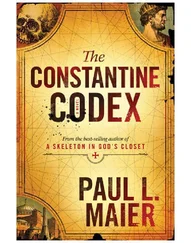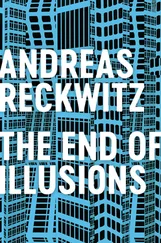J lifts his hand in a ponderous manner, squints and says: Oh-hoh! That machine, that machine is the best there is ( Oh-hoh ! — that was his way of expressing excitement). It’s a new invention, by a really famous manufacturer. A really famous make — I even used it myself.
B: What did you do with it?
J: I know the machine inside and out. I know every manoeuvre.
B: What, you mean your father let you loose on it? I don’t believe that for a second, ha-ha-ha, you can’t even insert a dowel pin. Craftsman my ass, ha-ha-ha! You don’t even know what it’s called, this machine!
It’s not hard to imagine Bornträger giving Weber an encouraging slap on the thigh as he says this, and yet the latter would never react, only stare over at the window with a strained expression. He felt sorry for J. Bornträger, on the other hand, had perhaps realised that my uncle was one of the happiest people in the world — completely unaware that he was being mocked, he would just gaze up like a dog being presented with a bone. That’s why Bornträger would mischeviously question my uncle in great detail about the things that excited him, the things he thought he understood (like machines, for example), but about which, in reality, he knew nothing at all. J would then offer up completely meaningless explanations that were always about the Biggest and Best and Newest of things, a kind of Wetterau Genius Language for trained engineers, admittedly devoid of any meaning but nonetheless containing some general terms that he had overheard. My uncle knew and could say words like hoisting crane, milling machine and disk sander , but when he uttered them he sounded as clueless as an inexperienced teenage boy talking about women. A language of longing in Engineer Speak. I can picture the sadness and helplessness in my uncle’s brown-black eyes when, in an attempt to satisfy Bornträger, he escalates to superlatives; Bornträger would continue to pull my uncle’s leg regardless. J often used to have this sad and helpless air about him in the cellar too, but I’ve always been convinced that he was never aware of this helplessness and sadness, that it didn’t even exist for him. Perhaps in much the same way as he was sometimes in pain but completely unaware of it — J was completely analgic from birth. In some ways, this had been helpful to him during his life: as a boy he had been pummelled day after day by children who went on to become respectable Bad Nauheim citizens and are still seen as such. But back then they would kick my uncle in the side as he lay on the ground, which in their view was where he belonged. Due to his scrawny legs and big ears, his lank hair and crazed expression, my uncle cut a conspicuous figure. This, along with the fact that he liked to ask questions and tag along with anyone and everyone, meant that he became easy prey, shuttling back and forth between his father, who loathed him, and his schoolmates, who would drag him along by his jug-like ears, stretching them all the more. Yet today his peers sit in the Bad Nauheim church and spend Christmas and Easter with their families, knowing all the while that they could stand by my uncle’s grave and confess to God: Yes, I kicked him too.
I have never found out whether Bornträger had been in school with J back then. After his first few years there, they bundled J off to a special school in the Rhineland, a long way away, with the aim of keeping him alive and as unscathed as possible. A Wetterau boy who they had to take out of the Wetterau for years on end so he could make it through and survive the Wetterau, yet he didn’t survive it, just like none of us will survive it. Back then, my uncle sat in the train staring out at a landscape that was still his landscape. Those were his fields out there, his Winterstein. There were no cars driving between Friedberg and Bad Nauheim before five in the morning, and the word bypass didn’t yet officially exist; in those days, the dictionary listed bypath directly after bygone . That was back when we still spoke dialect, before anyone else understood us. My uncle’s language doesn’t even exist now. He used to speak it on the train, be teased in it by Bornträger. All of this is no more than forty years ago. My uncle always travelled along the same route. Bad Nauheim, past Schwalheim, then over the Rosenthal viaduct, the so-called ‘twenty-four halls’ near which I grew up and which provided the backdrop for my childhood, like the famous railway bridge on the poster for Once Upon a Time in America did for the kids in the movie. Some of the stones used to construct the Rosenthal viaduct came from our quarry, my mother told me, although I have no way of verifying that. But she should know, because she ran the business for seven years; from 1967, the year when I was born, to when it was liquidated in 1974 and the last-remaining workers left the premises.
On his journey into Frankfurt, my uncle regularly travelled past the premises of the family business in Friedberg, so close that he could practically have spat on my father’s head, although he would never have done such a thing, given how in awe of his father he was. That was my uncle; he felt longing for some things and awe for others. In later years he saw my family home there, where the apple orchard used to be. He could see everything from up there in the train: the business getting smaller and smaller, more and more sections of it being cut away, the present becoming the past and not the future everyone had hoped for. Looking back, it had always been in decline. The business had blossomed during the Weimar Republic, and even the Third Reich had been bearable — from a Boll perspective at least. Apart from the fact that dead soldiers didn’t get individual gravestones. A dead Friedberg soldier never brought us much profit. If his mother died, on the other hand, that was good business. All the Marie Baumanns and Sophie Breitenfelders got individual gravestones. But those dead soldiers, after they had been sent off to war, were stowed away in just the same way they had been during the war itself — still living then but doomed to die — barracked, piled up and lined up, except that the communal barrack roof later became a communal memorial plate, the soldiers awaiting their communal resurrection in eternal camaraderie in the cemetery of Friedberg in the Wetterau.
We Await the Second Coming
But then everything fell to ruin, and globalisation took care of the rest. Now people here are buried beneath stones that come from around the world. Wetterau residents now lay to rest beneath imported gravestones. It started with stones from the Far East. Our cemetery was globalised before the term globalised even existed, and we became Friedberg’s first victims of globalisation, just twenty-eight years after the last war. Travelling through Friedberg by train, my uncle passed by the Hanauer Hof too, a brewery inn next to the cemetery where almost all of us now lie. The Hanauer Hof is where we drank to the dead after they were buried, usually with a schnapps and several pints of cider to chase it down. Although my uncle didn’t just go to the Hanauer Hof for the wakes, of course. And we went there for his too, after my uncle’s burial. Until the seventies there was a big factory behind the Hanauer Hof; it smelled of iron and electricity and an early phase of industrialisation, and its machinery was visible to passersby, all of it standing around in the open and unguarded on the land and spilling over into the town, and people like my uncle would stand there in awe in front of this machinery, gazing with the goggled eyes of child-like excitement. Today there are five supermarkets there, and Friedberg people no longer stand there in awe, staring with child-like excitement, but instead rush around between them comparing prices like lunatics. A senior-citizen Schnitzel-hunt between Tegut and Aldi and Norma, with a hardware store in between, although even that’s gone now.
Читать дальше











